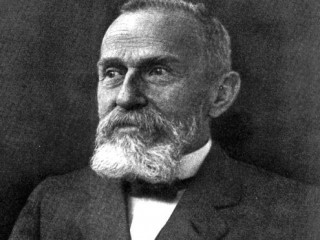
Eugen Bleuler biography
Date of birth : 1857-04-30
Date of death : 1939-07-15
Birthplace : Zürich, Switzerland
Nationality : Swiss
Category : Famous Figures
Last modified : 2011-04-19
Credited as : Psychiatrist, term schizophrenia, Freudian psychoanalysis
The Swiss psychiatrist Eugen Bleuler , noted primarily for his work on schizophrenia, was a renowned dissenter from the orthodox Freudian psychoanalytic approach to psychopathology.
Eugen Bleuler was born in Zurich on April 30, 1857. After taking his medical degree at the University of Zurich, he spent his professional life as director of the Burghölzli hospital, a neurological clinic near Zurich, and as professor of psychiatry at the University of Zurich. Bleuler's approach to mental illness included an appreciation of the importance of motivational factors in abnormal behavior, as well as an understanding that some of these motivational factors may be "unconscious," that is, not recognized by the patient himself. Consequently, he was attracted to certain aspects of Sigmund Freud's psychoanalytical theory. Bleuler began an early correspondence with Freud, and he appointed as his chief assistant at the Burghölzli one of Freud's followers, Carl Jung. Also on the staff of the Burghölzli was another Freudian psychiatrist, Karl Abraham.
Bleuler was present at the first International Psycho-Analytic Congress in Salzburg in April 1908. The first periodical devoted exclusively to psychoanalysis, Jahrbuch fur psychoanalytische und psychopathologische Forschungen, was directed by Freud and Bleuler and edited by Jung. Disagreements, both professional and personal, arose between Jung and Bleuler and, eventually, between Freud and Bleuler. Jung finally resigned his position at the Burghölzliand Bleuler resigned from both the Swiss and the International psychoanalytic associations.
Bleuler's contributions to psychiatry were in the field of psychosis. At the time he began his work, psychiatrists tended to think of dementia praecox (early insanity) as a single disorder. Bleuler argued that it was in fact a group of disorders which shared certain symptoms, such as a lack of contact with reality. He coined the term "schizophrenia" (splitting of the mind) as a general classification for these abnormalities. His choice of the term was dictated by his belief that the most characteristic aspect of the disorder was a splitting or dissociation of the patient's total personality. In this regard, Bleuler also introduced the term "ambivalence," which refers to the often conflicting feelings and emotions, both positive and negative, that schizophrenics, and indeed even normal individuals, feel toward the same person, idea, or object. It has been suggested that Bleuler's own conflict with orthodox Freudian psychoanalysis may have been motivated in part by his puritanical feelings about sex and alcohol and may provide an example of his own concept of ambivalence.
Another aspect of schizophrenic behavior studied by Bleuler was the tendency of some patients to withdraw from contact with the reality of the outside world and to live in an "inner world" of their own making. He termed this escape from outer to inner life "autism." Bleuler died in Zurich on July 15, 1939.

















